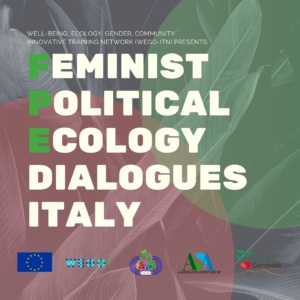Anna Katharina Voss and Ilenia Iengo interview Stefania Prandi (Fondazione Pangea onlus) and Simona Lanzoni (journalist) for November 25th, the International Day for the Elimination of Violence against Women and Gender-Based Violence.
Stefania Prandi is a journalist, writer and photographer dealing with issues of gender, work, human rights, Among her collaborations: Il Sole 24 Ore, National Geographic, Action, Swiss Radio and Television, El País, Al Jazeera, Correctiv, BuzzFeed. In 2018, she published the book “Oro rosso. Fragole, pomodori, molestie e sfruttamento nel Mediterraneo” on women labourers in Italy, Morocco and Spain and in 2020 the book “Le conseguenze. I femminicidi e lo sguardo di chi resta” on gender based violence. Both books were published by Settenove.
Simona Lanzoni is vice-president of the Pangea Onlus Foundation, a partner of the WEGO-ITN network. She is also the coordinator of the REAMA anti-violence network (network for empowerment and self-help) and second vice-president of GREVIO – group responsible for the independent monitoring of the application of the Istanbul Convention on preventing and combating violence against women and domestic violence.
This episode proposes a feminist look at the transversal nature of the different forms of violence that women experience. It focuses particularly on women living in rural areas and working in agriculture, on their lived, personal and embodied experiences and on the broader structural and societal context that shape them.
Starting from the campaign “Against the virus of capitalism and patriarchy” launched by La Via Campesina and the transfeminist global movement Ni una Menos, the date of 25 November is symbolic of a longer process and struggle, not just a day of commemoration. It symbolizes the struggle against the gender based violence that patriarchal capitalism imposes on women and on feminized subjects to include all non-binary, trans and queer subjectivities, everywhere in the world and through specific strategies particularly in rural contexts.
Rural women (farmers, labourers, fisherwomen, shepherds, artisans, young people, migrants) represent a very large slice of that humanity that works to reclaim labour dignity to guarantee food security and sovereignty through the production of healthy food; and to work with care, love and professionalism towards the environment. At the same time, this slice of humanity often remains invisible, unrecognised, exploited or subject to various types of violence. This is the case in Italy and across the world where nature and agriculture continue to be commodified. The pandemic has accelerated the dynamics of oppression and violence against women and LGBTQI+ subjects at all latitudes, both in family and collective contexts, both in metropolitan and rural areas.,making it necessary to develop a different paradigm based on social, ecological, economic, cultural conversions and going towards a society of care.
During the episode, Stefania Prandi talks about her books, in which she exposes the exploitation of women workers in fruit and vegetable farms. She draws attention to the still underestimated issue of violence in the workplace, by investigating the illegal recruitment of farmworkers. She shows how, in this context, women farmworkers experience a double-edged violence: one that has to do with precariousness, invisibility, lack of labour rights and another tied to the gender dimension, which means physical and sexual abuse and rape.
Simona Lanzoni reflects on the policy context of this issue. She notes how in recent years at the international level, important steps have been taken in order to recognize these forms of discrimination and violence particularly in rural contexts, and to take action and reclaim women’s rights: for instance, through the Convention on the Elimination of Discrimination Against Women (CEDAW), CEDAW Committee’s General Recommendation no. 34 on the Rights of Rural Women (2016) and UN Convention on Rights of Peasants and Other People Living in Rural Areas (2018).

Watch – and listen to – the full episodes here:
Episode 1 – An introduction to rural and peasant feminisms
Episode 2 – A dialogue on feminism and care for the territory with Comunità rurale diffusa
Episode 4 – A dialogue on the restanza movement in Irpinia with Maria Laura Amendola
Episode 5 – A dialogue on farmers protests in India with Irene Leonardelli and Arianna Tozzi
Episode 6 – A dialogue on the 8M feminist strike and territorial resistances
Radio Iafue has granted permission to publish the videos on WEGO’s website.

